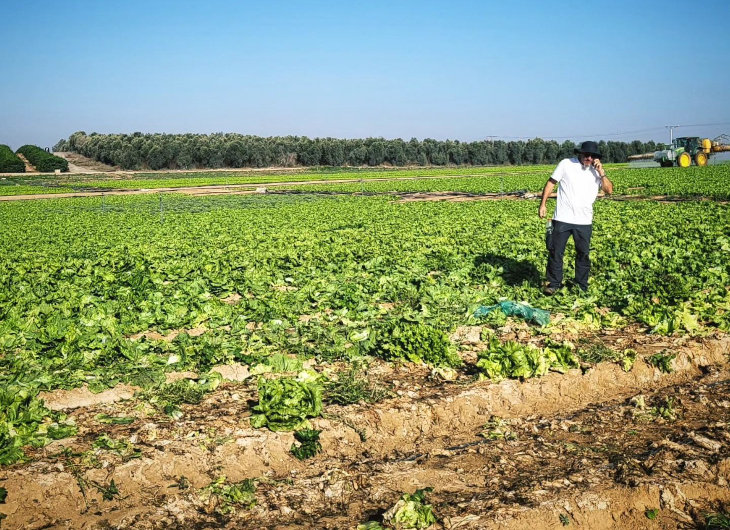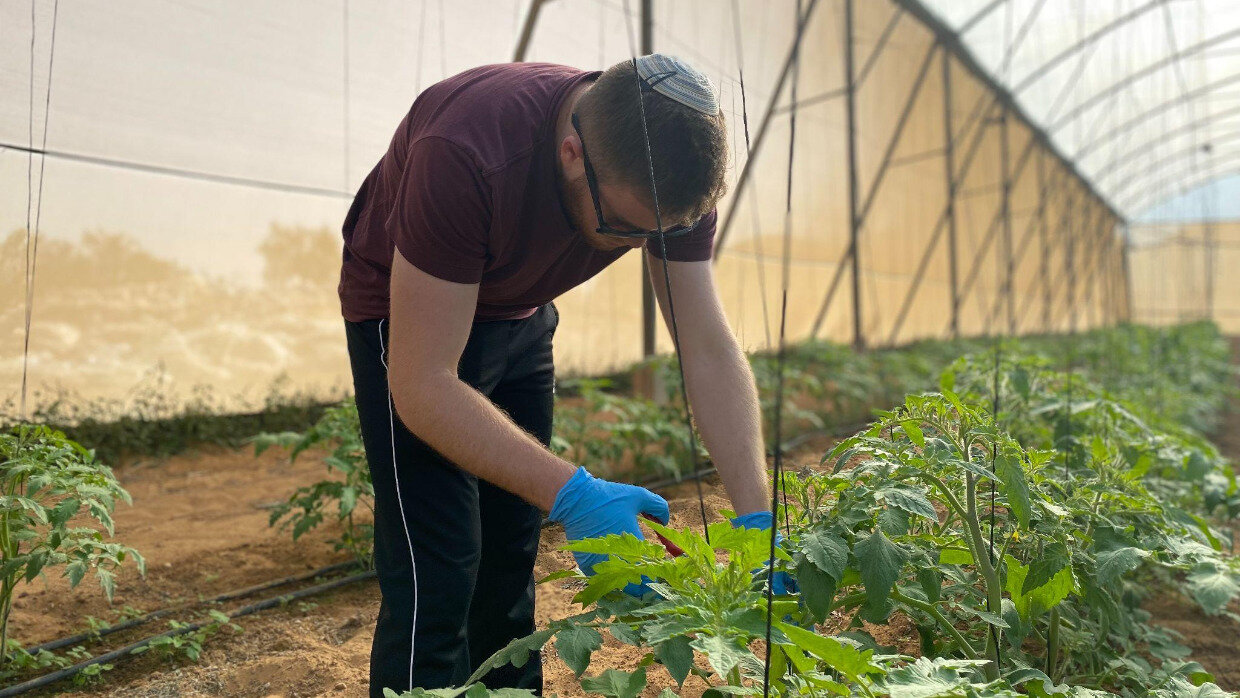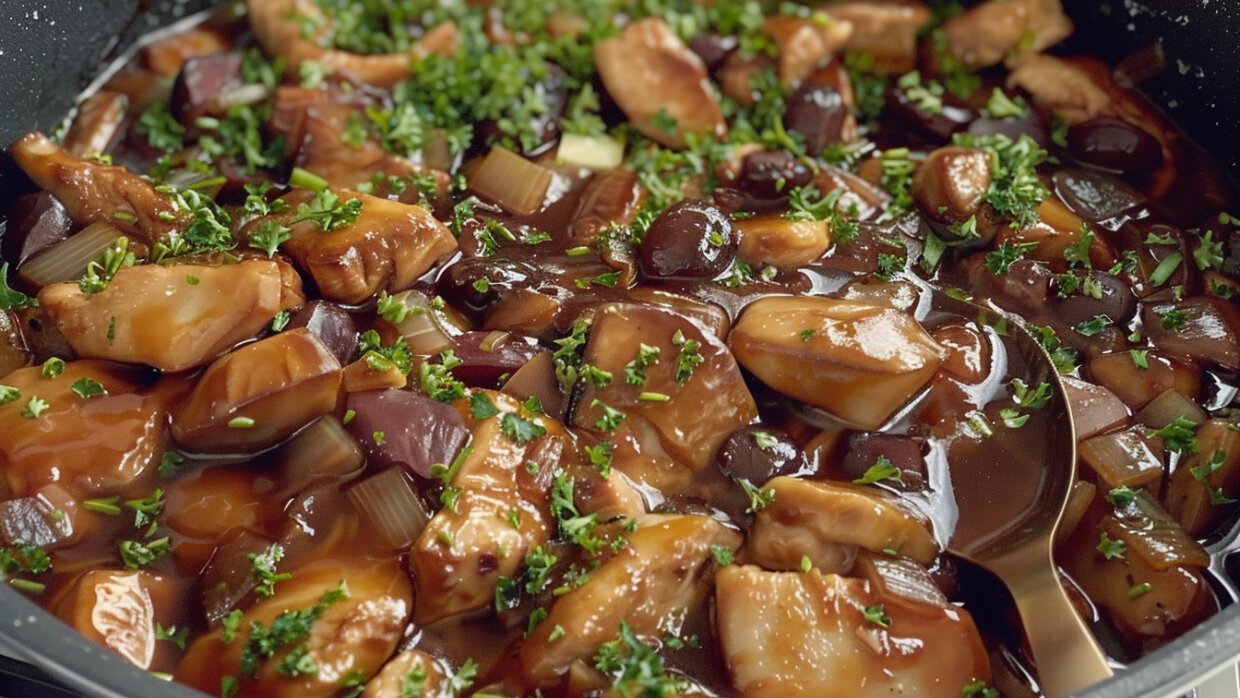One year ago today, this farm would be full of greenhouses flush with juicy tomatoes and hundreds of bustling Thai migrant workers. Now, it's a barren desert without a face in sight.
The last time I was let near a tomato plant was in my Zaide’s garden when I was 5. Then it was serene, and fresh tomatoes were waiting to be picked and popped into my eager mouth. Now, the only popping was the sound of artillery fire, which served as a sober reminder that despite the pastoral scene around me, we were a country at war.
Accompanied by the occasional “boom” in the background, I entered the greenhouse along with a few other volunteers looking to lend a hand to the farms in and around the Gaza area that had lost much of their workforce with their workers leaving the country. The farm owner tells us that over 50% of his workers left the country and much of the rest are serving in the reserves. The same story for every other farm in the area. Inside the greenhouse, there are rows upon rows of tomato bushes, as far as the eyes could see. It might’ve been beautiful had the circumstances been different. This is what Talmei Eliyahu has come to.
When we arrived, we were notified that there was no shelter within walking distance, and if there were to be rocket fire or flying shrapnel, we would need to lie down with our hands on our heads to protect ourselves from missile fire. Who knows if that would’ve even helped? This tomato field sat not five miles from the border with Gaza. These are the same tomatoes that, in a matter of months, will make their debuts in Israeli salads, matbuchas, and shakshukas around the country.
I came in expecting to pick ripe red tomatoes, possibly even cherry tomatoes (an Israeli invention), but I was surprised to learn that I would be doing nothing of the sort.
The sun beat down on my back as I knelt in the dusty soil of the tomato field. My hands worked methodically, pruning the vines endlessly for suckers (which I always thought was a joke term my grandfather used in his garden…guess he was right).
My job was to slice off these parasitic branches so they wouldn’t continue to sap the life of the tomato plant. It was mindless, mind-numbing, repetitive work, but in this context, it didn’t feel without purpose. The migrant workers whose job this is every day, all day, surely would’ve felt differently than me, but I was a man on a mission to help in any way I could while my brothers and sisters risked their lives in Gaza for me and my family.
Taking a break to wipe the sweat from my brow, I turned my face to the blazing sun. The woman next to me expressed her enjoyment for the menial task at hand. The monotonous nature of it was therapeutic for her. Whether it was the sense of purpose she felt of helping in a time of need or the spirituality of being so down to earth, she found value in it.
After the initial novelty wore off, it no longer felt purposeful but a coping mechanism to ignore the thoughts of my friends on the battlefield. To make matters worse, we were only pruning; the fruits of our labor weren’t visible, and I wasn’t even sure I was doing any good for the plants. I wanted to go and fight in some other way, a way that made me feel useful. But the political forces at play were far beyond my control. All I could do was focus on the long rows of tomatoes ahead of me.
For now, all I could do was live in this moment. Staying rooted in the present was my way of resisting the forces that sought to destroy. My quiet act of pruning and picking was, to me, a radical act of preservation. As I finished one row and moved on to the next, I prayed that one day, the hostages and soldiers on the battlefield would be able to enjoy the fruit of my labors.

I’m not the only one in these fields, however. Nationwide, there is a shortage of agriculture workers, casting serious doubt over this year's harvest. Luckily, brave members of the Shomer HaChadash organization and many others are helping out in farms and greenhouses throughout the country. What my experience in Talmei Eliyahu showed me is that we all play a part in defending Israel and assuring the survival of this land and our people.


















I loved the time I spent at Talmei Elyahu over 30 years ago, we lived on a converted bus and our 'host' family treated us wonderfully, they always invited us to Shabbos dinner on a Friday evening, wonderful, wondeful memories
I worked on a moshav trimming the tomato plants too (at least we were inside a hot house without the sun on us). I found it inspiring to see how much works goes into the tomatoes that we just buy in the supermarket without a thought of who planted, pruned, picked and delivered them. I enjoyed your article and hope to continue to help the farmers in this holy work.
Aryeh - Thanks for this beautiful article. I am in California, and we are praying for all of you. You are doing G-ds work, and he will bless you. Thank you for all your words and hard work supporting your country and community.
Hi: Writing from the other side of the world….New York City. I was touched by your dedication to grow those beautiful tomatoes and especially “cherry” tomatoes. As for myself, I too share your love for growing food and on my small apartment balcony in Queens, I have grown cherry 🍒 tomatoes in pots. Whenever I pick these delicious tomatoes I give thanks to Hashem for allowing me this gift. We are at the end of the growing season in NYC but look forward to next year. Didn’t know about the plant suckers and will need some guidance… I pray that your garden will be blessed once again and thank you for sharing. Have grown basil, chives, frying peppers 🌶️ and dill all in pots.
PS We hold the people of Israel 🇮🇱 in our prayers.
What an amazing article! Aryeh's Zaide must be kvelling.
If it helps, remember the life and the giving force of that tomato plant. These are G-d’s gifts - food for our lives here to continue. As you pinch suckers, talk to the plants. Tell them how much you appreciate them and how important they are to so many. Care for them as you care for your own because they too are a living thing that wants to live and reproduce and your help is necessary for their success. I hope this helps.
Nicely said, Ms. Cheryl. All living things have the sparks of Hashem, including food. That's why we feel hunger, because our neshama wants those G-dly sparks. 🙂